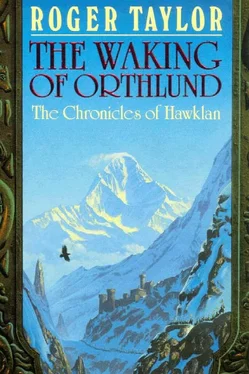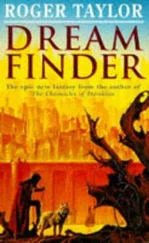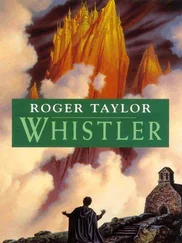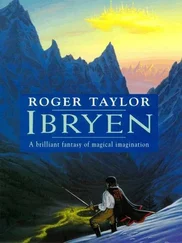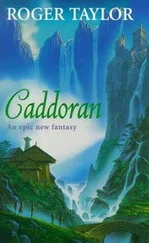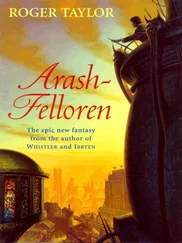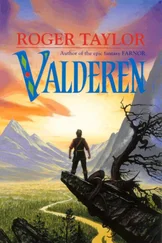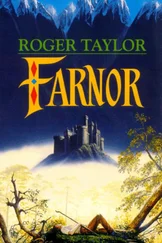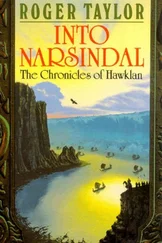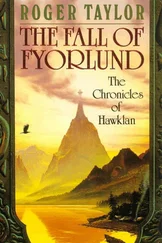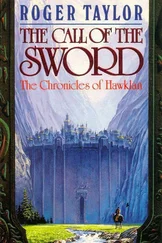Roger Taylor - The waking of Orthlund
Здесь есть возможность читать онлайн «Roger Taylor - The waking of Orthlund» весь текст электронной книги совершенно бесплатно (целиком полную версию без сокращений). В некоторых случаях можно слушать аудио, скачать через торрент в формате fb2 и присутствует краткое содержание. Жанр: Фэнтези, на английском языке. Описание произведения, (предисловие) а так же отзывы посетителей доступны на портале библиотеки ЛибКат.
- Название:The waking of Orthlund
- Автор:
- Жанр:
- Год:неизвестен
- ISBN:нет данных
- Рейтинг книги:3 / 5. Голосов: 1
-
Избранное:Добавить в избранное
- Отзывы:
-
Ваша оценка:
- 60
- 1
- 2
- 3
- 4
- 5
The waking of Orthlund: краткое содержание, описание и аннотация
Предлагаем к чтению аннотацию, описание, краткое содержание или предисловие (зависит от того, что написал сам автор книги «The waking of Orthlund»). Если вы не нашли необходимую информацию о книге — напишите в комментариях, мы постараемся отыскать её.
The waking of Orthlund — читать онлайн бесплатно полную книгу (весь текст) целиком
Ниже представлен текст книги, разбитый по страницам. Система сохранения места последней прочитанной страницы, позволяет с удобством читать онлайн бесплатно книгу «The waking of Orthlund», без необходимости каждый раз заново искать на чём Вы остановились. Поставьте закладку, и сможете в любой момент перейти на страницу, на которой закончили чтение.
Интервал:
Закладка:
Girvan looked from Olvric to Yengar and reached his decision. ‘I’ll have the watch on the coast increased,’ he said. ‘And give orders that Morlider are to be captured and taken to Dremark.’
Chapter 30
The Morlider War had been fought mainly in the north of Riddin and following its dreadful conclusion the various allies had said their sad farewells on the battlefield and departed directly for their homelands. Thus neither Yengar nor Olvric had ever visited Dremark.
It was unlike anything they had ever encountered in Fyorlund. Where Vakloss stood high on a solitary hill, dominating the surrounding countryside and domi-nated itself by the Palace, Dremark was spread over the floor of a lush valley, its centre being overlooked by those outskirts that rose up the valley sides. Where Vakloss had tall, haughty buildings, bedecked with elaborate and colourful wood carvings, Dremark had wide, open streets and smaller, simpler buildings whose plain white walls were decorated with expansive painted murals showing, inevitably, horses and horse riders: horses grazing on rolling countryside; horses in battle, from travelling columns to cavalry charges; horses working in the fields; horses in Festival celebrations and parades and, above all, in the Helangai, a fearsome game played at the least excuse and with monumental zest by seemingly all the Riddinvolk.
Girvan’s line had played it once on the journey from the north, shortly after they had crossed the River Endamar. It seemed to Yengar to be almost like an act of thanksgiving now that they were leaving the harsher pastures of the north behind them.
The principle of the Helangai was simple enough: a large, weighted bag, suspiciously man-shaped, was to be picked up and carried to an agreed place on the field. It could be played anywhere, and by any number of riders, and would sometimes last for days, ranging far and wide across the countryside. Apart from outright murder and maiming, however, there seemed to be no rules, although Yengar noted that anything which threatened to injure the horses brought swift dismissal from the field for the offender.
He and Olvric watched it for a little while from the edge of the field, but with their unerring instinct for survival, soon retired to a nearby, higher rock to watch the remainder of the game in a combination of amaze-ment and bewilderment.
At one point, Lennar, circling wide, rode by them and stopped to wipe perspiration from her flushed face. She waved enthusiastically to Yengar. ‘Get your horse. Join in,’ she cried.
Yengar declined the invitation as politely as he could, but freely cited cowardice as his excuse.
‘It’s only a little knockabout. Nothing serious,’ the woman declaimed, puzzled, but seeing Yengar was not to be persuaded, she was soon swept into the fray again.
Olvric chuckled.
‘Shut up,’ Yengar said brusquely, staring intently at the mayhem swirling in front of them.
Olvric’s chuckle turned to a barely stifled and pro-longed laugh.
The journey to Dremark had been hard on Sylvriss’s escort. They had neither the mounts, the skill, nor the endurance to keep up with the Muster line for any distance once they moved beyond a leisurely trot. Girvan was thoughtful about his guests and tried to keep the pace moderate, but even the Goraidin were more than pleased when at last they came to the top of a ridge and saw Dremark sprawling below, peaceful in the autumn sunlight; the silver thread of a river running through it.
The city streets were busy, but their width and the sense of spaciousness afforded by the relatively low buildings lent it a relaxed and pleasant air. Girvan had sent the captives in discreetly, by post-wagon, and had equally discreetly sent a personal messenger to Urthryn to tell him of the unexpected arrival of his daughter and of her wish to enter Dremark unnoticed. Thus their arrival was that of an ordinary Muster line accompanied by a few strangers, and attracted little or no attention, although one or two passers-by stared at Sylvriss awkwardly, trying to place a long-forgotten face.
The murals fascinated the Fyordyn, as did the prac-tice of the Riddinvolk of grassing the roofs of their buildings and sweeping them down to ground level in long continuous ramps.
‘Look, horses on the roofs,’ Kirran exclaimed de-lightedly, when the nature and function of the architecture became apparent. ‘These people are splendid.’ Then, gazing round: ‘It’s bigger than it seems from above, but these buildings still seem small. I wonder where they all live.’
‘Below ground,’ Sylvriss said, catching the remark. ‘Most of our buildings go at least twice as far below ground as they go above it.’
Kirran snapped his fingers. ‘I remember someone telling me about it,’ he said. ‘Fascinating. But what a strange way to live.’
The Queen smiled at this inadvertent discourtesy. ‘No,’ she said, laughing. ‘It’s very cosy. Personally I found it quite difficult to understand a people who chose to live high in the air on top of a hill, especially when their winters were so long and so cold.’
Kirran, realizing his mistake, began stammering an apology, but the Queen waved it aside, still laughing.
Then, accompanied by Girvan and one or two other riders, they were riding slowly into the city estate of Urthryn, the Ffyrst of Riddin and father to Sylvriss.
Despite the comparative warmth of the day, the Queen pulled her hood forward.
The extensive parklands of the estate were calm and peaceful after the bustle of the streets. Here and there, horses were grazing, and a few individuals were quietly tending the gardens. They paid little heed to the passing riders. The surrounding trees were rich with the yellows and golds of dying leaves and the whole was redolent with the soft scents of autumn.
The buildings at the heart of this quiet estate were taller than most of those the Fyordyn had seen in the city, but they had the same simple elegance although, conspicuously, their walls were undecorated. A small group of people stood at the foot of a broad flight of steps that led up to a wide patio which fronted the largest building.
As they drew nearer, Sylvriss urged her horse for-ward. Girvan signalled to the others to stop, and, as if at the same signal, the waiting group by the steps divided, leaving a solitary grey-haired figure watching the approach of his long-absent daughter.
Yengar and the others looked on in silence as Sylvriss dismounted and stood in front of her father. They stood for a little time looking at one another and, perhaps, talking, then without haste Urthryn opened his arms and the two embraced.
Girvan nodded his group forward, and the standing watchers too, converged on the couple.
Later, after they had eaten and been shown their quarters, the two Goraidin found themselves alone with Urthryn and Sylvriss and two of Urthryn’s closest advisers.
Yengar saw his Queen’s face in her father’s vividly as, smiling, he ushered them into a large, light room and waved them towards a circle of high, cushioned couches.
‘Excuse me, gentlemen,’ he said, pausing in the doorway. ‘There’s another who should be joining us here, I believe. I won’t be a moment.’
When he returned, he was accompanied by a tall man with a high domed head and a long narrow face. He was wearing a long, plain robe secured by a rope about his waist.
‘May I introduce you to Oslang,’ Urthryn said. ‘He’s from the caves, up north.’ He cleared his throat. ‘To be honest, I was on the verge of politely throwing him out, but after listening to Girvan and my daughter, his story is just one among three wild tales now, so I thought we’d hear them all together.’
Oslang bowed slightly. ‘Thank you, Ffyrst,’ he said. ‘My brothers and I knew that it would be difficult to persuade you of our news, but you’ve been patience itself. I’m just glad that other signs have appeared without any real hurt having been done to your people.’
Читать дальшеИнтервал:
Закладка:
Похожие книги на «The waking of Orthlund»
Представляем Вашему вниманию похожие книги на «The waking of Orthlund» списком для выбора. Мы отобрали схожую по названию и смыслу литературу в надежде предоставить читателям больше вариантов отыскать новые, интересные, ещё непрочитанные произведения.
Обсуждение, отзывы о книге «The waking of Orthlund» и просто собственные мнения читателей. Оставьте ваши комментарии, напишите, что Вы думаете о произведении, его смысле или главных героях. Укажите что конкретно понравилось, а что нет, и почему Вы так считаете.
